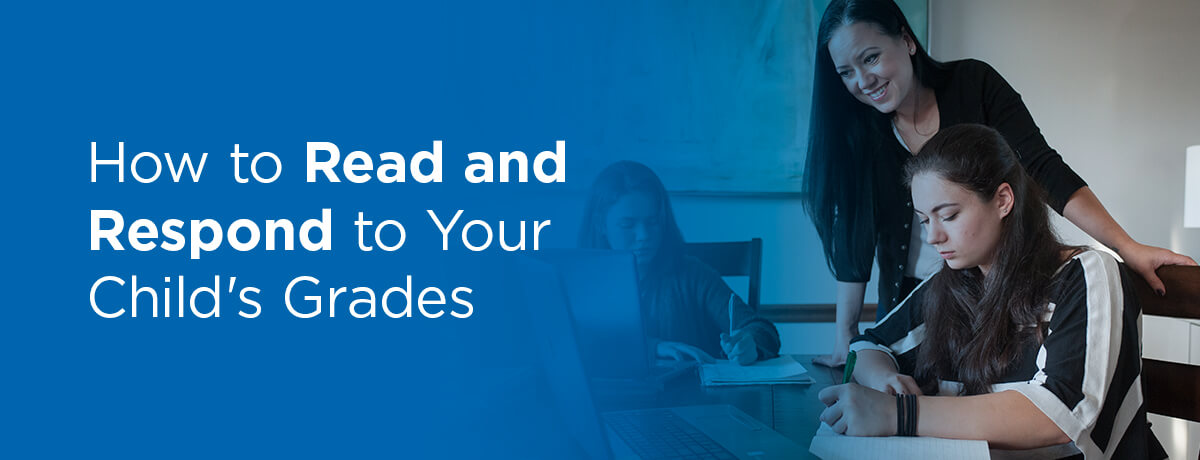Enrollment Now Open for Second Semester. Click Here
Enrollment Now Open for Second Semester. Click Here

What do those letters or numbers on your child’s report card mean, and how do you talk to students about their grades? Grading systems can evolve over time and vary from school to school, so you may need to learn more about how to interpret your child’s report card. Whatever grading system your school uses, there are some guiding principles you should follow as you support your child in their academic journey.

When your child brings home a report card, you may be tempted to read it right away. However, that isn’t necessarily the best approach. Make sure your child has a chance to view and process their grades first. By doing this, you can gain a sense of how your child feels about their grades. A student who is excited to share their grades likely thinks they did great, while a student who appears embarrassed likely feels their grades do not meet personal or parental educational expectations.
Solely viewing grades at the end of a semester or year isn’t ideal because it can be blindsiding. Maybe you assumed your child was doing well only to find out they didn’t achieve proficiency. At Commonwealth Charter Academy (CCA), we believe in transparent grading that makes it easy for parents to check in on how their children are doing throughout the year.
That’s why we use the live grade book feature from our learning platform called edio — Education for Individualized Outcomes. Edio was created with students and parents in mind and personalized to complement the unique education we provide.
In edio, you can view current and projected grades so you don’t have to wait on a report card. This feature keeps parents updated on their child’s performance in real time. You can help your child troubleshoot when necessary or celebrate their accomplishments along the way.
To understand your child’s grades, you must first understand the grading system your school uses. Some common grading systems include:
If your child’s school uses a typical percentage or letter-grading system, it’s helpful to understand what each letter grade means. Most of us have preconceptions about what constitutes a good or bad grade, but it’s best to set these preconceptions aside to learn more about the true meaning of each letter grade:
On a standards-based grade report, you likely won’t see percentages or typical letter grades that range from A to F. Instead, you’ll see a list of standards along with a letter or number to signify the student’s level of proficiency. One common approach is to use numbers 1-4:
Should you reward your child for A grades and chastise them for getting low grades? It can be difficult to know how parents should respond to grades — after all, you want your child to do their best. However, research has shown that overemphasizing the importance of academic achievement can have negative effects on a child and does not lead to higher grades. Instead, children who don’t experience undue pressure from their parents to perform at a certain academic level tend to enjoy better mental health and are higher achievers.
Parents should focus on being supportive and encouraging, regardless of their child’s grades. First, focus on the positive. Celebrate your child’s accomplishments, even if they aren’t perfect. A C+ or B- is well worth celebrating if it’s an improvement on a previous grade. Also, avoid comparing your child’s grades to their peers.
There is no one-size-fits-all solution for how to handle “bad” grades because it depends on why the student got that grade. For example, you may need to be more stern with a teenager whose grade reflects a poor work ethic, while a kindergartener who struggled with a certain concept or class may need consoling and encouraging above all else.
Whatever the cause of the poor grade, it’s always best to focus on positive change. For older students especially, ask them why they think their grade turned out that way and what steps they need to take to achieve a higher grade next time. Also keep the emphasis on proficiency and future success rather than an arbitrary number or letter goal. If you see your child working harder or taking other steps to improve, let them know you’re proud of their efforts.

Parents play a key role in encouraging their children throughout their schooling experience. At CCA, we believe that a child’s education should be a team effort — this is the best way to support young learners personally and academically. That’s why we have a Family Services Department devoted to building strong relationships with families and helping them during the transition to cyber school and beyond. If you’re interested in joining the CCA community, contact us today to learn more about CCA’s family services.
Enrollment Now Open for Second Semester. Click Here